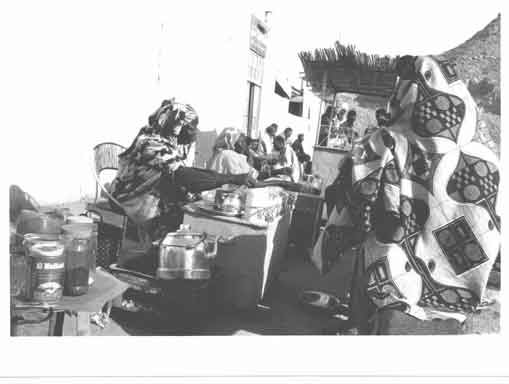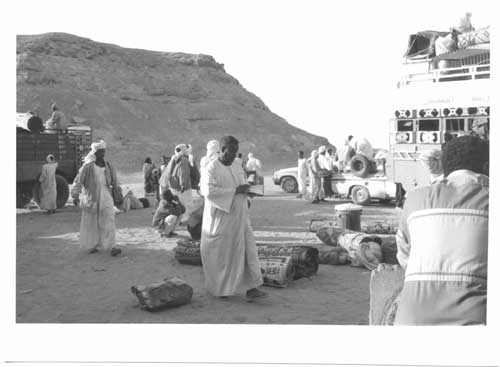TUE, 13 FEB 2001
Quite cold night. Even wind comes up. The deck is totally blocked with
the goods imported by the traders. The place on a wooden box, next to
the captain's bridge becomes target of wind. Have to leave the place unless
I want to get frozen. Leave the deck and find a seat next to a chair next
to first class dining room. Morning has broken. The boat stops at a remote
place. Just a few baracks. Military area. Later we pass Abu Simbel. Cruiser,
trees, probably tourist facilities. The statues in the rocks look great.
Later on the boat stops outside a small harbor. Two rather big buildings
in the distance. Boat stops for an hour or two. Small boat comes along
and drives back. Don't know what that's for. Still think that we are not
at Wadi Halfa, but it is Wadi Halfa. Really surprised. Then the boat moves
towards the mole. Officials around. Passengers getting their luggage and
goods together. Have to collect my passport. Difficult to walk through
all the piles of goods. Have to fill out three forms. Finally receive
my passport. The boat already anchors. Nobody can go out. Bloody officials
block the entrance, exchanging documents and looking at photos, one of
them brought with him. Finally we try to get out. At the small door an
official is checking a page of the immigration form. Totally clever.
Two trucks equipped with seats are waiting. The customs halls are a few
hundred meters away. Walk there. Modern, spacious halls, announcements
as in a modern train station. Lautsprecherdurchsagen wie auf einem modernen
Bahnhof. Have to fill out a money declaration. Labels are stuck on the
bags. No check on the content. Get out the hall. Land Rover taxis are
waiting. Paddy, Patricia, traveller from Belgium, and Graham are negotiating
the price of the fare. We are confused by the different ways od adressing
the currency: pound and dinar. The notes are in dinar, but called pounds,
and 10 dinars are called 100 pounds. A Sudanese is informing us that this
is Sudan not Egypt, and the taxi fare is fixed: 300,00 Dinar. A man on
a modern mountain bike, Midhat Mahir, arrives and gives us money for the
taxi. We may give it back to him tomorrow. Takes some time until the taxi
is full. The owner piles up luggage on the roof and even steps on the
roof that I fear it may break as I am already perched under the self-made
construction. Finally the car leaves and after a short ride we arrive
at Hotel Wadi El Neil. Choose a room. Rooms are with three and more beds.
Sand floor. Walls made of corrugated iron. A traveller from Japan takes
the third bed. Eat at a restaurant next to the hotel. Visit the market
together with Brano. Walk along the lake shore. Ruins of former hotels.
Meet a man, Kamil, he invites us to his house. Shows us photos of old
Wadi Halfa, now on the bottom of the lake. Stay there until darkness.
WADI HALFA
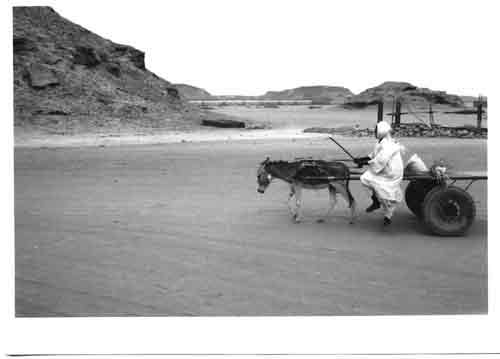
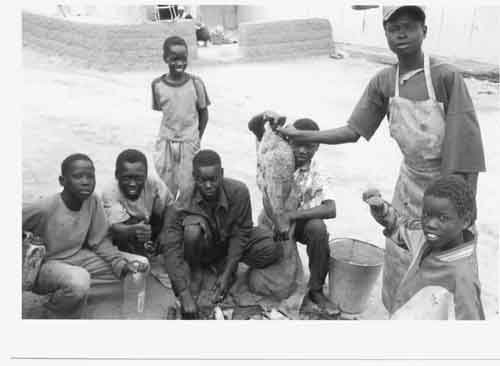
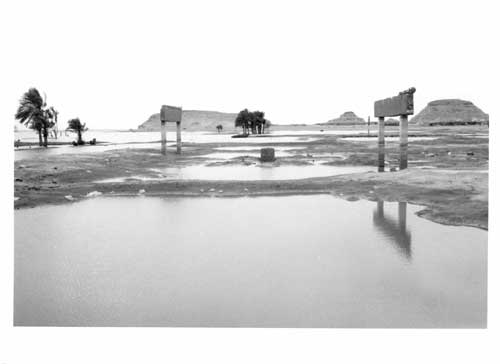
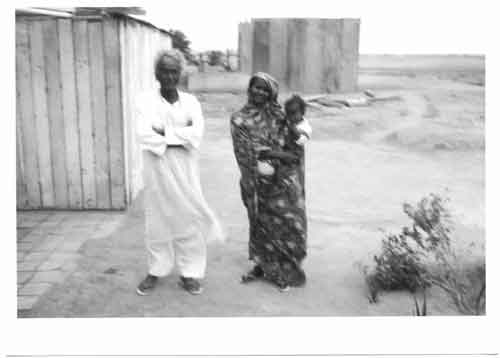
WED, 14 FEB 2001
10:00. Everybody is busy around. The hotel is full. People about to leave
to different destinations. The boat for Aswan leaves in the late afternoon,
as does the train to Atbara and the bus to Dongola. Breakfast at the restaurant
next to our hotel Wadi El Neil. Leave for the bank not far from there.
Won't get change there, because of unknown reasons. Have to walk to the
train station. Loading and unloading activities. Piles of luggage in front
of the station. Heavily loaded pickups arriving. Also activities at the
freight wagons. Change money and visit the nearby restaurant. Only bread
and hard boiled eggs to get. Walk back to the market. Eat at a fish restaurant.
Brano meets a group of students. Geological faculty. One of the young
men assists us in searching for postcards. We have a look at several shops
and even visit another small market somewhere down to the lake. That market
is for plastic goods, fabrics, perfumes, paper, etc. No postcards, only
birthday cards including sound. Meet Lukas and he shows me the registration
office. Very bureaucratic and obviously for making money. Have to fill
out three A4 pages. Watch the departure of the bus to Dongola in the afternoon.
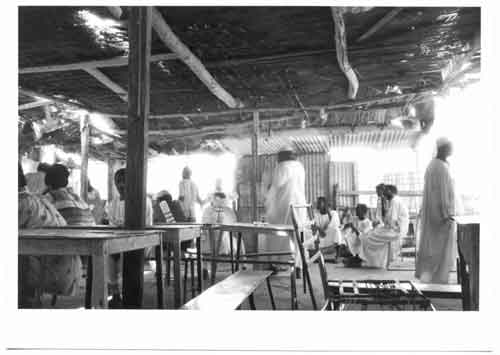
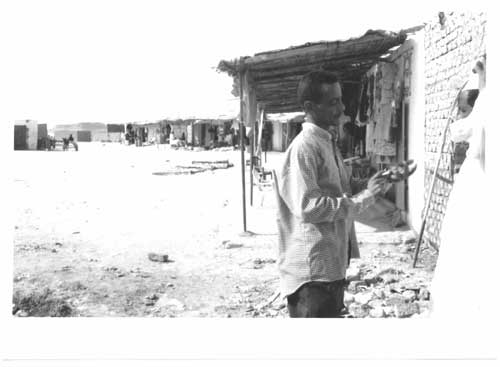
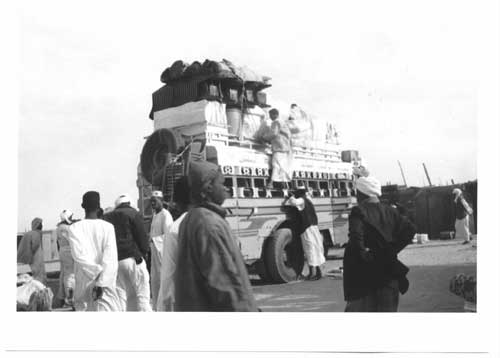
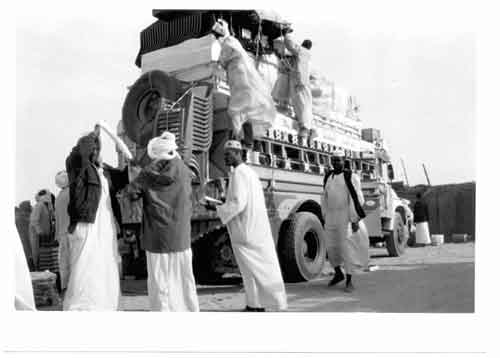
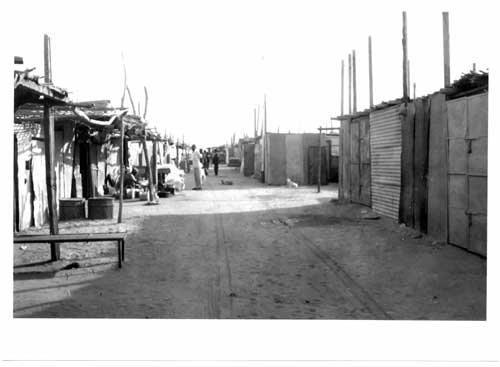
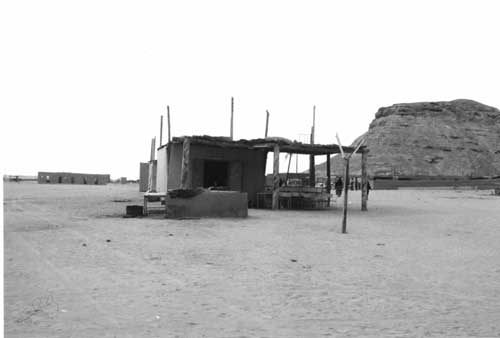
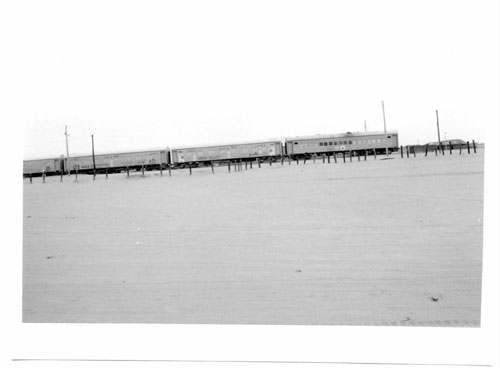
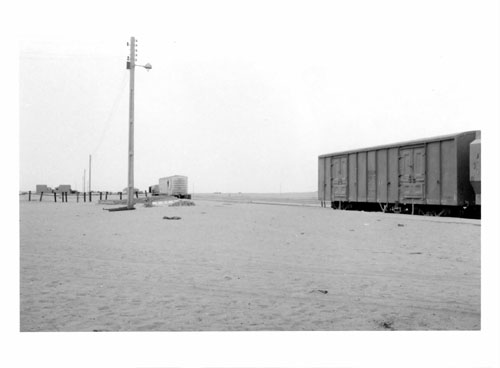
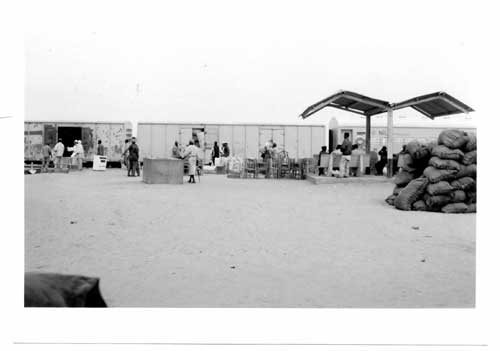
THU, 15 FEB 2001
9:30. Rather cold night. No blanket, just three layers of bed sheets.
Not very effective. Meet Steven and join him for Hotel Wadi Halfa. Spiced
coffee there. Talk to a man from Lebanon. Take a walk down to the lake.
Two iron made boats on the shore. Walk around a hill. Quite big boat on
the shore, actually on the sand. Obviously there for a long time. Two
fishermen with a small boat just coming ashore. They show about 6-8 fish
weighing 2-3 kilos each. Steven chooses three and I pay for them. Back
to the market. Look for candles, matches, postcards, blankets. The man
from Lebanon takes the fish to a restaurant for to be prepared. Meanwhile
I search for a blanket. Find Asian synthetics and Indian horse-blankets.
Don't know why I decide to buy a huge tablecloths instead. Made in a Middle
Eastern country. Back to the restaurant where the fish is ready.
Walk up the hill close to the hotels. Looks quite huge, but isn't. We
are up in a minute. Wonderful view. Then we walk towards a hill in the
distance. Cross all the flat section and walk up the hill west of the
high antennas and parabolic reflectors of the military. Continue down
to the waterworks. Built three years ago. Two elderly men in charge. They
show us the different basins and the hall with the pumps. Continue toward
the river where the water is taken out. Electricity pylons just lead far
out into the water. Looks like the waters of the lake have risen. Reach
a beautiful garden. Irrigation. Small house. Several men around. In the
garden grow tomatoes, aubergines, grass for donkeys. The owner offers
tea and we have a short rest. Further on we reach a village. Many gardens
there. People working in the gardens. Abdul Hadji, who joined the walk,
has disappeared. Steven receives tomatoes and onions from a farmer. We
walk up a hill behind the village and head for the town. Getting dark
already. Have an excellent supper at Hotel Boheira. A woman, mother of
three small children, prepares the fish for us.
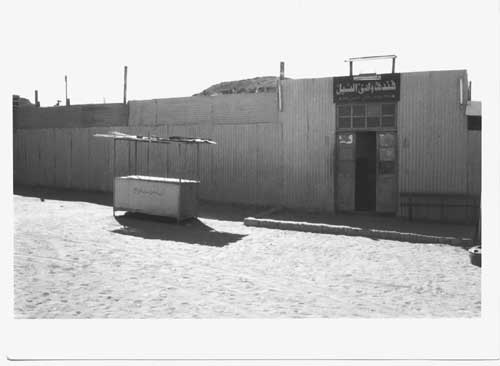
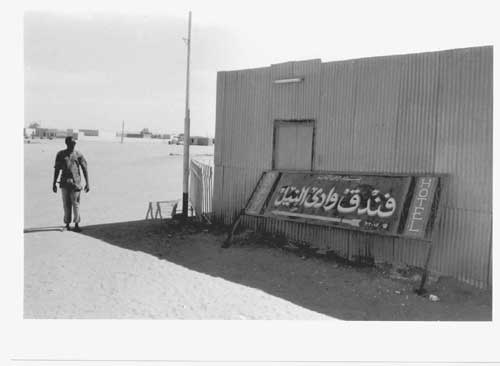
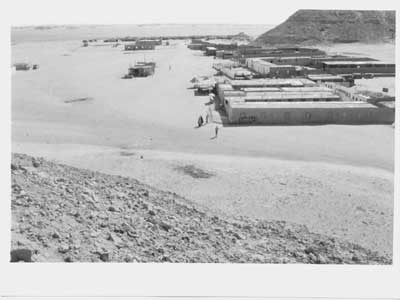
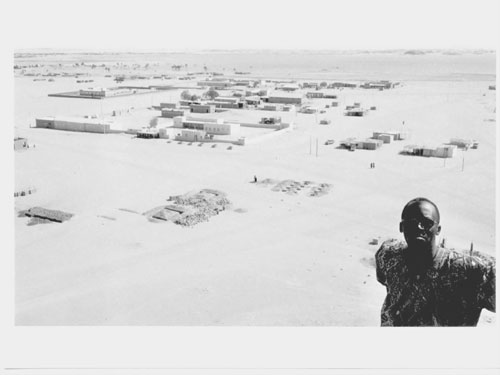
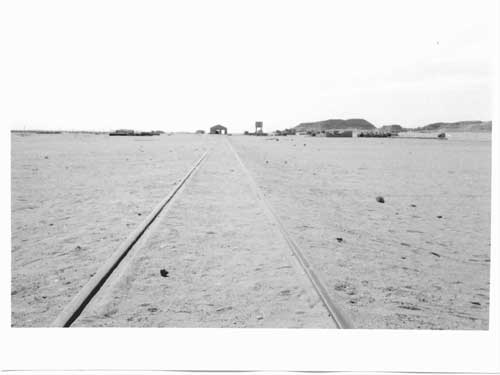
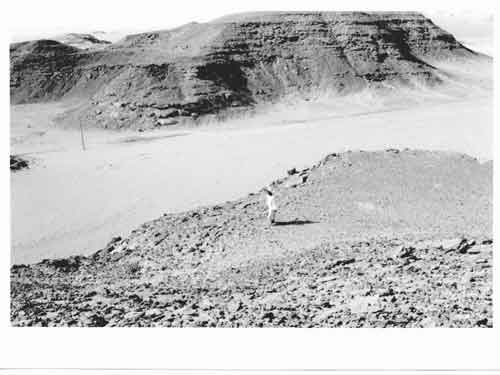
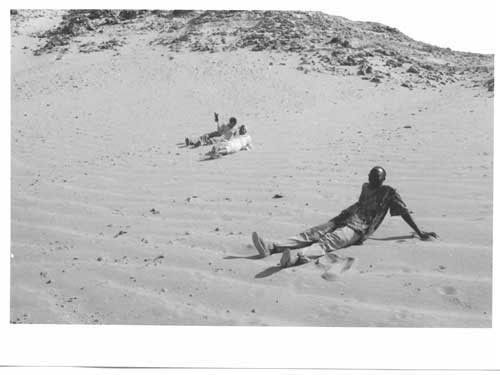
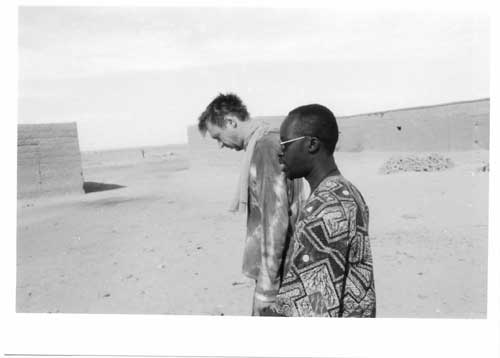
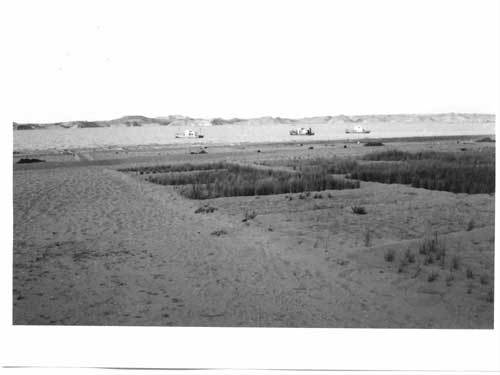
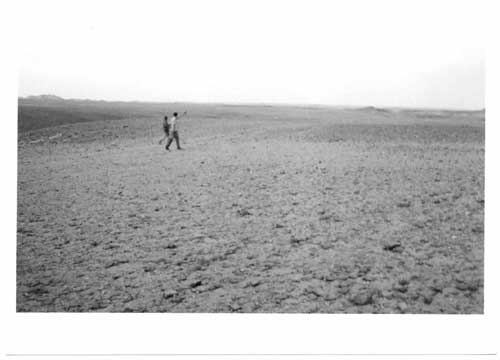
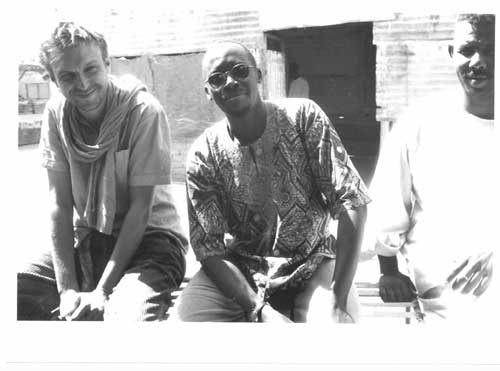
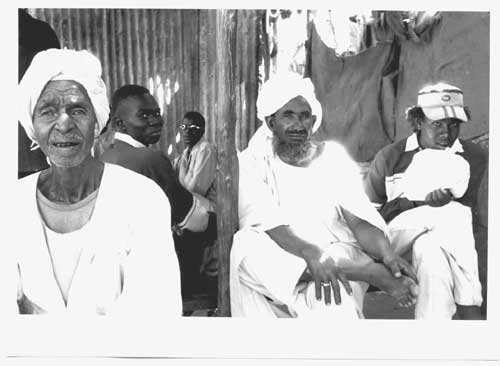
FRI, 16 FEB 2001
8:00 Rather cold night, despite the blanket-like-fabrics I bought. Visit
the market. Buy some kind of doughnuts, baked in oil on charcoal fire.
Together with carkadee. Hibiscus tea. Walk around, buy bananas. Brano
takes them to the hotel. Buy a plastic bag, to use it as dust protection
for my luggage and some kind of safety belt-like material. Have a look
at Hotel Boheira. Only Aziz, the slim tall manager of the hotel, is there,
carrying the youngest of the woman's children. Back to Wadi Halfa Hotel.
Meet Steven and Brano there. We take tea and leave again for Hotel Boheira
to meet Aziz, who invited us to his home. Cross the whole city on our
walk. Even get a short lift from a truck. Shake a lot of hands on the
way. Aziz's house is unexpectedly huge. Big terrace, chairs remaining
from the former hotel, which was destroyed by floods. Six, seven people
show up during our visit. Aziz serves tomato salad, boiled eggs, feta
cheese, sardines and bread. Later, tea is offered. Hassan, a teacher,
passes by. Informs us about school fees, which are surprisingly high.
No internet in Halfa, due to telephone structure, even though Sudatel
comp. recently installed new telephone lines. Before, connecting had to
be done by hand and needed a lot of dialing. We leave, walk towards the
end of town. See the checkpoint on the road to Dongola. A lorry is rushing
towards the town, creating a huge cloud of dust. It's the transporter
for fish. Head towards the lake. The shore is totally flat. Structures
of former gardens and fields. On the way we get invited into a house.
Beautiful and clean. Totally empty yard. Two elderly women resting in
a very dark room. Tea is offered. Some younger women are around. A cassette
is played. Steven, Brano and the owner talk about Sudanese music. Finally
we leave and walk along the lake shore. Guavas are torturing my guts.
Shore is totally flat. We pass the remains of destroyed buildings near
Kamil's house, who we got to know yesterday, and reach our hotels a little
later. Have a rest, it is already getting dark. A hotel guest invites
me for tea at hotel Wadi Halfa. Steven comes along with two children in
his arms and invites us for supper at Hotel Boheira. We walk there. The
mother of the three children has prepared fool and other beans. Abdil,
the man with a long scar on his cheek, warns us about the danger of beans.
There is a strong wind blowing through the hotel foyer. The hotel, in
fact, is a corrugated-iron hut. The lady receives a phone call from Cairo.
Her husband's sister. Everybody is excited. Leave for home. Nobody out
later than 21:00. Go to sleep also. Strong wind. Again a cold night.
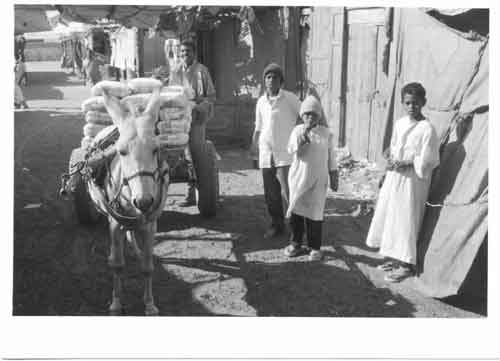
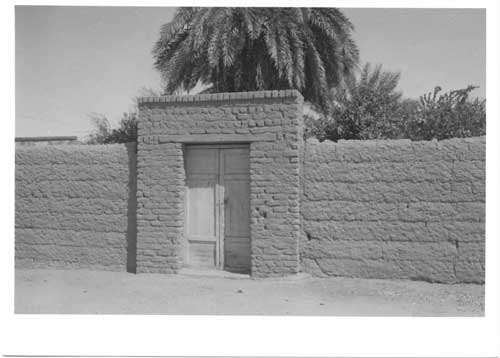
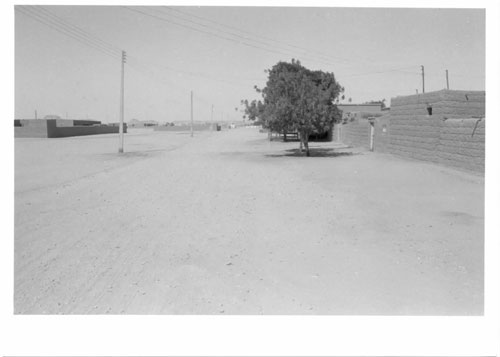
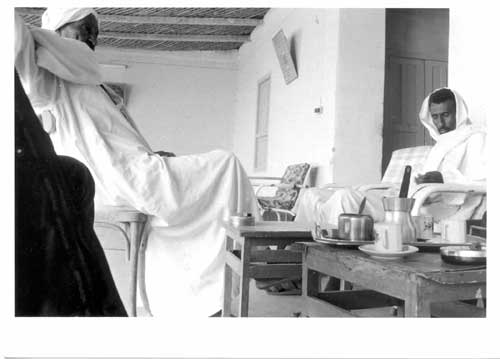
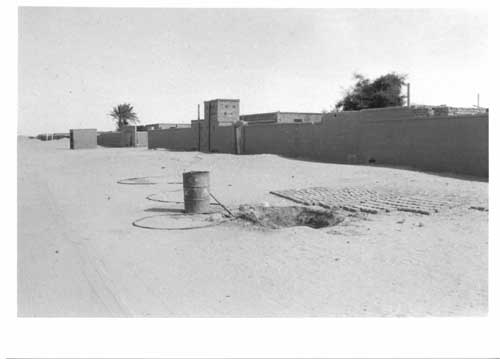
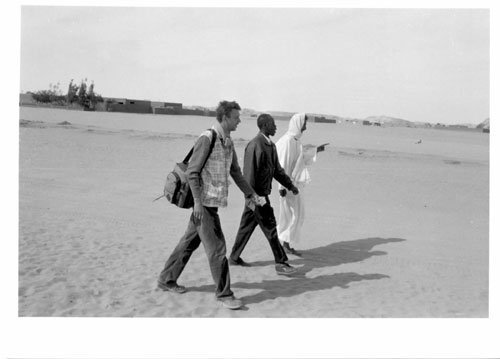
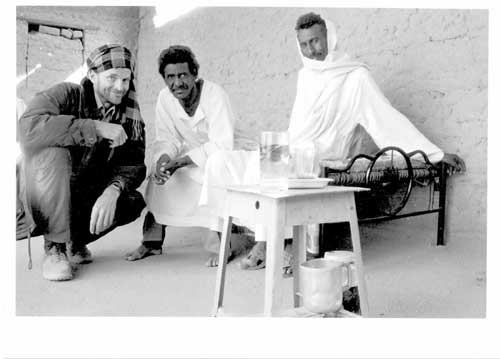
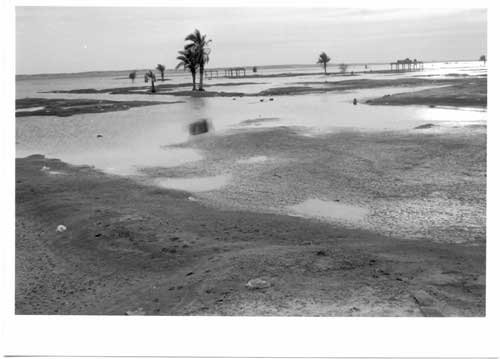
SAT, 17 02 2001
8:00 Freezing at night. Wind. Hear the muezzin in the early morning. Can't
breath because of totally blocked nose. Visit the market and buy tomatoes,
bananas, 2 grapefruits, potatoes, tahin, aubergines, lemons and halva.
Bring it to the Hotel Boheira. Tahin, doughnuts and halva for breakfast.
Walk to the railway station. Change at the bank next to it. Walk back
along the lake shore and visit the market. Meet Medhat on his mountain
bike. We have a rest in a tea shop. Brano and Steven come along. We stay
a long time in a tea shop. Brano buys local tobacco. The man who invited
us into his house yesterday is managing the deal. We visit the ticket
office and cancel the departure for village Abri, Medhat had arranged
for us this afternoon. Don't feel like going. At the office is the owner
of the refrigerator lorry. He suggests taking us to Abri tomorrow. Visit
a restaurant. It's on the corner to the fabric market. Order fool, tomato
salad, fried eggs. Short rest at the hotel. Together with Steven towards
the railway station. He knocks on one of the doors of a railway barack
as he knows a lady there. She is from the south. Catholic. Her husband
works for the railways and has gone to Atbara. A young soldier lodges
in a room in the house. He is from the south, too. But now he is a Muslim.
Talking about religion. We leave. Pass the rails. Walk towards a part
of town that is rather poor. No electricity, no water, no trees, poorly
built houses. Friendly people everywhere. Shake hands. Boys hanging around,
playing a game related to Bocchia, using batteries instead of balls. Men
playing a kind of board game but using stones of different colours in
the sand. 2 players, 6 men audience. Cross this part of the town and get
to the lake shore. Young girls filling Nile water into plastic containers.
A donkey cart transporting a barrel is parked in the shallow waters. We
accidentally pass a house where a refrigerator lorry is parked. Unfortunately
the driver can't take us. Cross the suburb village again. Girls coming
from a school step out of a Land Rover. Sunset. Very warm light on the
clay walls. Long shadows. Have a tea at a small gathering corner. Meet
a teacher from Nigeria and a young man from Juba. Abdil Hadji from Hotel
Boheira joins us since a while. On our walk back we cross the plain section
where the hotels were located before they got destroyed by floods. The
clay walls dissolved, just some concrete parts still remain.
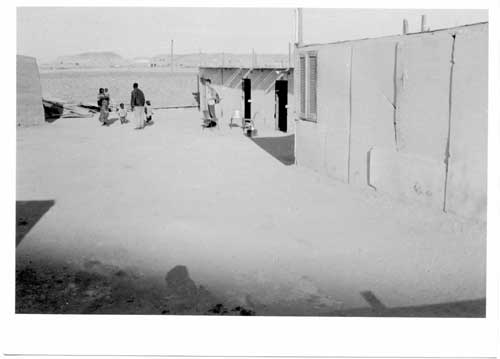
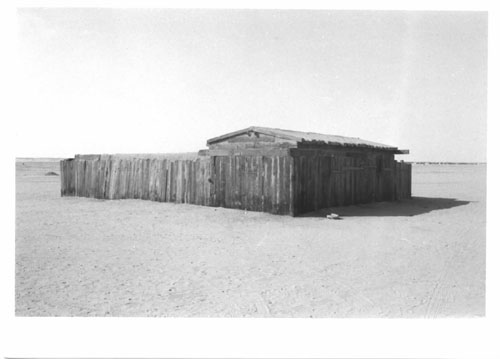
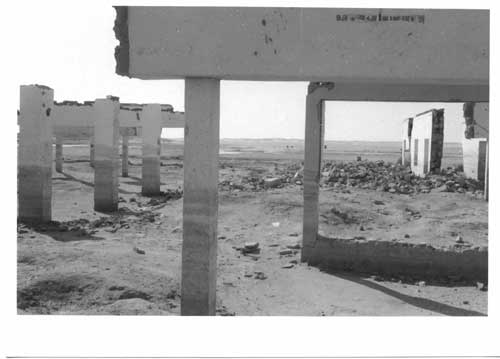
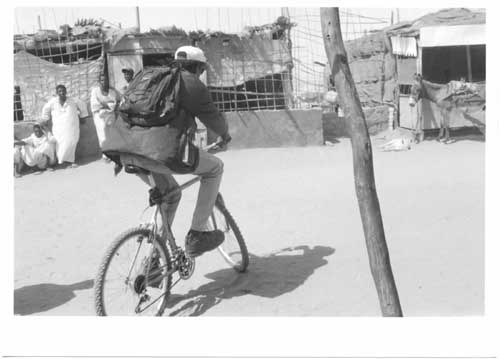
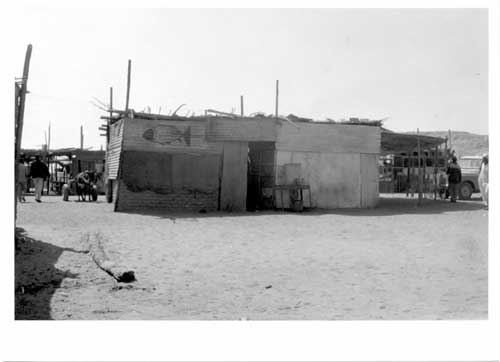
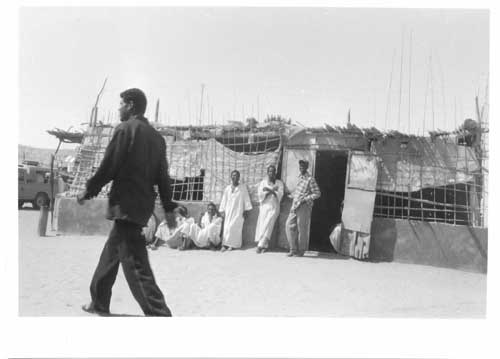
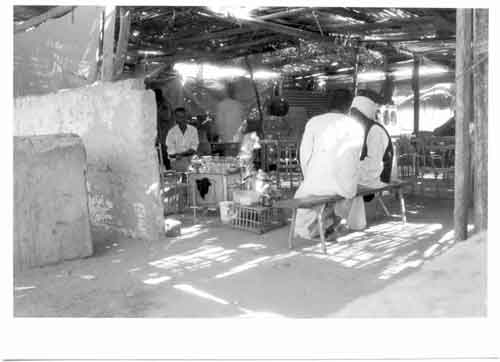
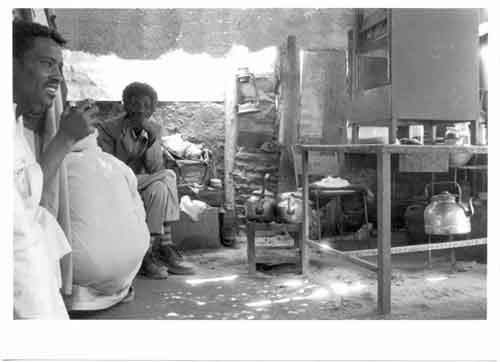
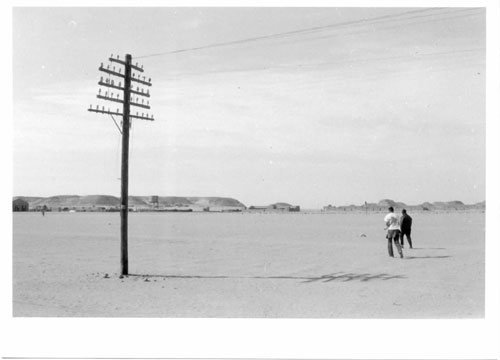
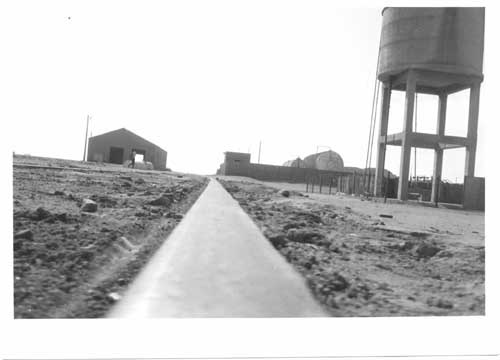
SUN, 18 02 2001
8:00 Cold night. Wind. All these days wind. Tea at Wadi Halfa hotel. A
truck parks there, driver wears a black coat. Leaves for Dongola. Shall
we go with him or stay? Meet Steven at Hotel Boheira. The children are
in good mood. Their mother suggests moving to somebody her husband in
Cairo has told her about by phone. Likely to the part of the town we have
been yesterday. No electricity, no water, no trees. Visit the office of
the ferryboat. Steven wants to take his ticket. Bukrah, inshallah. Tomorrow,
as God will. Visit a fax office. Looks quite modern. Starts working after
12:00. No electricity now. Visit the registration office. The chief is
from the south but converted to Islam due to job conditions. Steven is
talking with him. The office receives two calls when we are there. First
is the brother of the chief, second, the chief is calling in his car.
Visit the post office. Due to the schedule of train, boat and plane there
is no work at all there. On the way to the market we pass a group of elderly
man in an office. Azin's father is amongst them They invite us to stay,
but we continue to the market. Have a tea somewhere. Look for this and
that. Lunch at a restaurant we haven't been to before. Lentil soup, fried
eggs, tomato salad, bread. Have a rest at a tea shop run by a lady we
already know. She has got a golden earring. Or was the ring pierced in
her nose? Look for tahin and shoe polish and a brush. Back to the hotel.
Change to hotel Wadi Halfa as it got walls built of clay not like Hotel
Wadi el Neil, which is built of corrugated iron. We suggest it might be
not so cold at night. Have a rest outside Wadi el Neil Hotel. Back to
the market. Visit a workshop. Indian single cylinder engine powers a generator
for welding. Any work done in the sand. The glasses of the welder are
worn out sunglasses. We walk up the rocks next to the market. Great view
to Wadi Halfa, the township south of the railways and the desert hills
to the east. Small farm just beneath the cliff. We see about three or
four cows inside labyrinthine buildings. Stay at the cliff for some time.
The rock is falling apart due to wind and heat. Back to the hotel. Three
4WD cars parking in front of Wadi el Neil Hotel. Older men. Germans. Perfectly
equipped. Tents on the roofs of the cars. Tools, clothes, everything in
metal boxes. They cook by themselves. Try to get bed sheets at our new
hotel. They don't have any. We pack and move back to hotel Wadi el Neil.
Rest outside together with Medhat, Steven, Wolide and some others. Amongst
them an older, grey-haired man from Khartoum heading for Cairo. Speaks
good English. Wants to take the boat on Wednesday. He sleeps outside as
he can't afford to pay for a hotel. Meet Steven at 20:30. He prepared
the dried fish he got from the owner of the refrigerator lorry. It's quite
good, but the fresh one, of course, is much better. Wolide prepares a
salad. He works peanut butter into tomatoes and acts like a savage. Both
of his hands are full of peanut butter and tomato liquid, but he doesn't
hesitate to take the salt container, the knive and anything else. Wolide
does a song performance later. He uses the chair for percussion. Leave
at about 21:00. Polish my shoes. Brano has some minor stomach problems.
Watch the stars for some time.
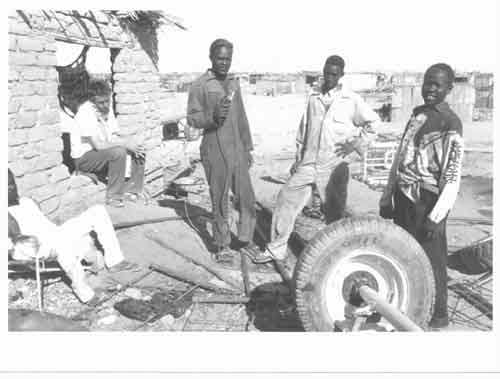
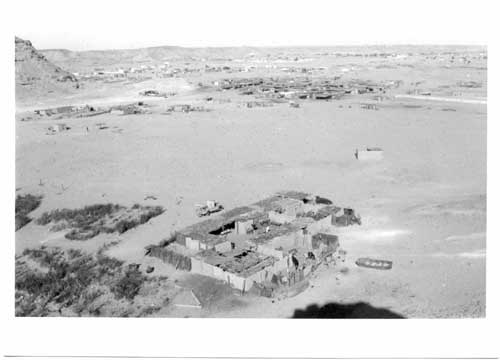
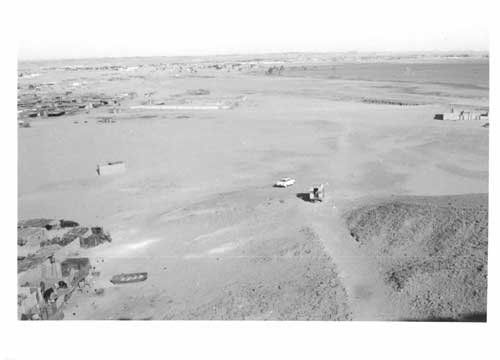
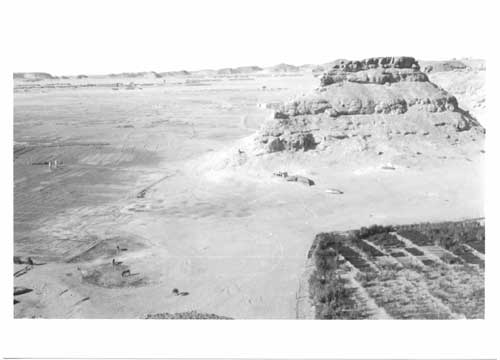
MON, 19 FEB 2001
7:45 Sunrise over the desert hills. Walk to the market. Stay at the lady
preparing the doughnuts. Take some tea also. Watch the market life. Ask
for transport at the ticket office. There is probably one to Kerma. I
shall ask again at 14:00. Meet Steven and head for the market again. Rest
at one of the fish restaurants. Steven looks for Wolide but can't find
him. Order some fish. Back to the hotel. Pay the bill. Pack. Head for
the bank near the railway station. Closed. Back to the market. Ask about
the transport to Kerma. Now I get the usual answer. 'Tomorrow or the day
after tomorrow'. Bukhra inshallah. Back to the hotel. Have a rest there.
Eat a grape, some bananas and a guave. Flies are around. Brano is resting
too. Sleep for some minutes. The door in the next room is banging to and
fro. Load my camera accus at the hotel foyer. Flies. Clouds. Eagles in
the sky. Very warm light close to sunset. Buses arriving, likely from
Dongola and Atbara. Unloading goats. Passengers boarding at the hotels
around. Outside Hotel Wadi Halfa two young men fry fish and run a restaurant
with a few tables. Go there together with Brano. Later on we have a rest
next to our hotel entrance at the small chai shop of a lady. Medhat is
around, a man from Sudantel and the grey-haired man, who sleeps outside.
Steven comes back from the part of town the lady with the three children
has moved. Wolide comes and goes or comes from sleeping.
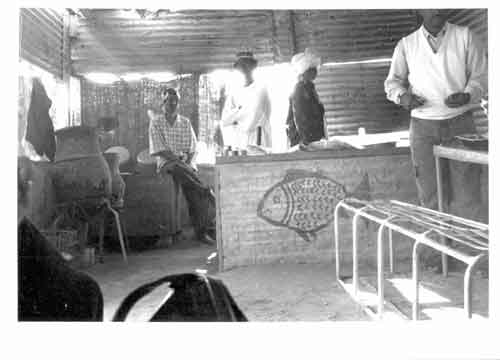
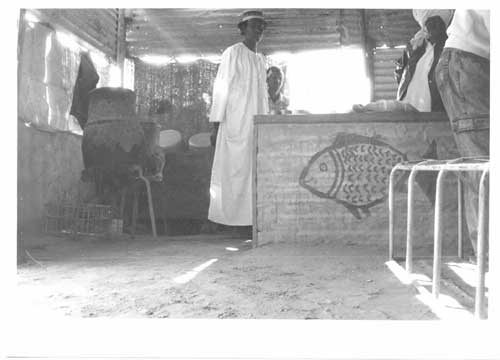
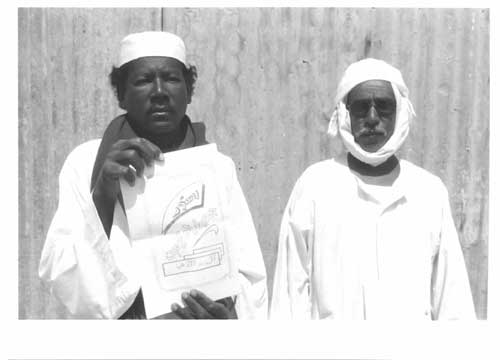
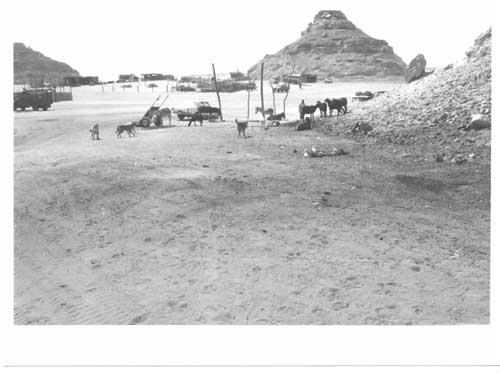
WED, 21 FEB 2001
7:45 Head for the ticket office. Should be there at 8:00. Still closed.
Most of the market too. Ticket office opens rather soon. Have to write
our names onto a list. The bus company can't issue tickets. Bus supposed
to leave at 16:00. Head for the bank. Somehow crowded. Brano and Toni,
a Swiss traveller who arrived with an Austrian Pinzgauer car, are there
too. Try to find something to eat near the railway station. Rather poor.
Loading and unloading activities. Back to the hotel. Hang around in the
tea shops in front of the hotel. A tea shop usually is run by a woman.
She has a small, low table with several glass containers for coffee, tea,
ginger, carkadee, etc and a big container for sugar. Her chair is also
very low. Further on a water container, a small bench. Toni and an older
man from Holland talk about traveling in North Africa. Both have driven
several times towards Senegal. A frequent topic is crossing southern Morocco
and Mauritania. Meet Steven and give two postcards to him or was it yesterday?
We pack and carry our luggage to the market. The bus is loading. Still
many goods piled in the sand near the bus. Boys do the loading. Don't
understand the system how they are doing it. It's rather slow. We hang
around in a nearby tea shop. Near the bus too much wind and dust. After
one or two hours, the plastic chairs are loaded. Then we pass our rucksacks
and the boys place them between the chairs. Rather safe. Huge bundles
of plastic carpets are then loaded. Finally we take off between 18:00-19:00.
But not far. Bus stops already near the hotels. Another stop at the checkpoint
at the end of town. Men get out and pray in the sand. Already gets dark.
Cold wind. Very rough road. Goes up and down. Surface corrugated. Desert
dust around. Driver leaves the main track frequently and takes side tracks
to avoid the corrugated sections. Not too much sure that it has a positive
effect. Pass heavy road construction equipment. Why is it not used to
grade the terrible road? After an hour a stop. Two boys and the chief
engineer settle beneath the truck, disconnect the cardan drive. The suspension
shaft is broken. It is screwed off, the part is put together with a string,
a belt is wrapped around it, and another holder around that, the whole
thing is screwed together again and additionally tied together with a
string. Ingenious assembly.
